Sorrow & Blood
Interview with Bill Taylor

MF: Bill, what is the importance of this book?
BT: First, nowhere else will you find a “resource anthology” that is truly global, with 68 voices from 22 nations, women and men who represent the essence of what we call in the WEA MC, the “reflective practitioners” of our world. Each writer speaks from deep experience and passion, bringing a unique depth and breadth to this international feast for the mind and heart.
Secondly, it’s the way the book is structured, a formidable yet enticing buffet to challenge, nourish and grow the soul. The bracing appetizer builds the foundation with a global survey, tackling the issue of definitions (especially persecution and martyrdom), working through the demographics of martyrdom. Then the first main dish displays a panoply of biblical and theological themes, surveying Scripture, addressing the seductive prosperity gospel heresy. The third set of main plates addresses issues related to preparation before, support during and healing-reconciliation after the hard times of persecution. This section releases voices (again North and South) from the local church, the mission agency, the strategists, the stories of families and missionary kids whose parents were martyred, the guidelines for crisis management and prevention, the ministry of the shepherds and member care providers. The last course gives two shorter sections: final themes (primarily prayer) and bibliographic-Internet resources.
MF: What’s the background of this long-term project?
BT: This book was conceived at the Iguassu missiological consultation convened by the WEA Mission Commission in late 1999. At that event the participants challenged the MC leadership to research and write a serious work on suffering, persecution and martyrdom. From gestation to birth, took 13 years.
MF: How did you select your editorial team and your writers?
BT: The challenge was to discover and select the writers. We poured over a global list of women and men who had something to say and were competent writers. We needed voices from around the world; we needed the theologians and the church historians; we needed the very personal stories of those who had suffered; we needed stories and more stories (thank you, Miriam Adeney!) that would salt down the book and make it more readable. We needed writers who would represent the spectrum of voices: from the local church to the mission agency, from the seminaries and missionary training schools to the member care providers, from the researchers and theologians to the grass-roots servants.
We needed writers with passion and clear heads, people who wrote from tested reality with something to say. It’s at least a lower-level miracle that not a single writer whom we invited turned us down. For many of them English was a second (perhaps a third) language, and that meant careful editorial work. I am deeply grateful for our copy editor, Koe Pahlka, who has helped us with other MC publications.
MF: Why did you dedicate the book to the “unknown ones”?
I just love this question! The book is dedicated “To the ‘unknown ones’ who because of their witness for Christ have suffered, been persecuted and even martyred. Unknown to the broader world, they are known to their families and friends; and their names are written in God’s book. They are fully known and cherished by the loving Father, the suffering servant Jesus, and the comforting Holy Spirit.” This came to me in Cape Town, 2010, as we listened to a young North Korean school-girl’s story of suffering, and that of an American widow, whose husband had that year been martyred in Afghanistan. They represented the “known” ones, and the Spirit embedded in me the idea of the “unknown ones.”
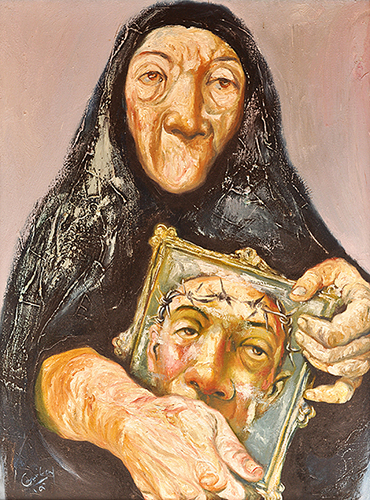
MF: How did you define some of the key terms?
BT: We left some of the tensions and differences in place, because even amongst Christian writers there is not unanimity. Here are two key ones:
- Persecution: “Any unjust action with different levels of hostility committed primarily based on religions convictions, directed at Christians, limiting their freedom to practice and propagate their faith.”
- Martyrdom: “The death of a Christian believer who loses his or her life prematurely in contexts of witness because of human hostility.”
MF: In what ways is persecution becoming an issue in the Global North, particularly Europe and North America?
BT: This is a challenging question, because of the misguided thinking that persecution takes place only where it is obvious, i.e. countries where the political, economic, legal, educational, media, religious, cultural, spiritual and familial forces (the nine forces) mitigate against the gospel.
However, we in the West have clearly witnessed in the last 20 years a change in the opposition climate to orthodox Christianity. Europe leads here. In some ways the continent is about ten years “ahead” of the USA, and Canada perhaps five. That is, the political, religious, legal, popular culture, educational system and media forces are increasingly lining up against true Christianity.
MF: What other resources do you use that report on the persecution of Christians?
BT: Today I Googled “persecution of Christians” and got 18,200,000 hits; “religious liberty” and got 29,400,000 hits. These are “in-topics” and realities on the ground and around the world. Even as I write this line, we pray intensely for our sisters and brothers in Egypt, Syria, Nigeria and Iran. “How long, oh Lord?”
In 2011 the Pew Forum released a massive report on religious liberty around the world. But the reality is that 75% of the restrictions are directed against Christians. This is primarily the case in countries where Islam, Hinduism and Buddhism exercise inordinate power.
Sorrow and Blood presents an excellent listing of Internet resources. Here are some of the prime sites I use to study and speak and write on these themes:
- WEA Religious Liberty Commission
- Open Door's World Watch List
- United States Commission on International Religious Freedom - Annual Report 2013
- Pew-Tempelton Global Religious Features Project
- Voice of the Martyrs
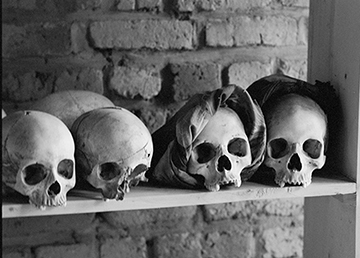
MF: In what ways does this book apply to the local church, to the Bible colleges and seminaries, and to the mission agencies?
BT: The book is a natural text for contemporary mission courses in Christian colleges, seminaries and missionary training schools. One chapter reports on the survey of missionary training centers to determine where persecution themes were included (or not) in the curriculum. We were distressed to find how absent they were in the North, even more surprised to see their absence in some South countries, but grateful to see them particularly in/for Islamic, Hindu, Buddhist contexts.
As I speak on this topic around the world, I ask believers how many sermons they have heard on persecution from their pastor. The responses are predictable, at times,
and surprising in others. It is largely absent from pulpits of the North. Why is it not part of our core training curricula? How are mission agencies equipping their constituency and their future missionaries to face suffering and persecution?
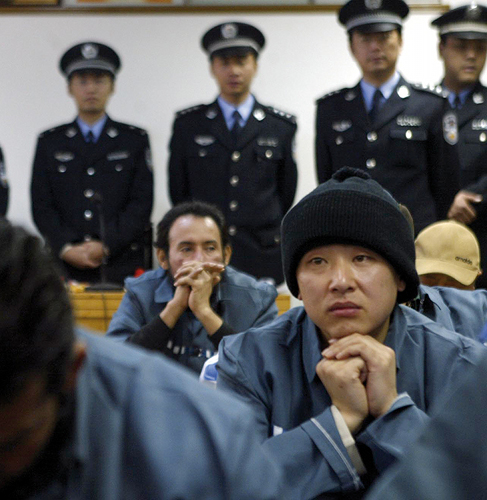
MF: How does a person read such an extensive resource anthology?
BT: Well, don’t be turned off by the size, because the book is truly very readable. It does not have to be read from front to back, but rather selectively. Ask the Spirit to guide you as you survey the table of contents. Read the Foreword (to be read), and the introductions to each of the major sections. Mediate on the art in the center of the book. It is not a novel, so read slowly, even devotionally. Select the chapters that catch your attention. Go to others that will stretch you. Engage with the many stories that breath flesh and blood.
MF: We hear you have an idea for your own book on these themes. What can you tell us at this point?
BT: This question has a singular background for me personally. The fact is that more writers than I expected sent in their chapters (thanks to extended deadlines). The book was getting too long, and something had to be sacrificed. The sacrificial lamb was my major article, and it pained me to spike it. It had been my summary of what I teach in a 25-hour seminary class, and I was eager to include it. But it had to go. Then a friend suggested that I turn that chapter into a more accessible (popular but not lite) treatment of the themes of suffering, persecution and martyrdom. And that gradually morphed into a project tentatively called Persecution: Global Reality Coming to your Neighborhood Soon. In late 2012 my wife, Yvonne, and I were on sabbatical in Israel. There the Spirit guided my thoughts to “track with Jesus” and his teaching on persecution.
During our season in the Galilee a major download came after multiple readings of Matthew’s Gospel. I was moved to read how Jesus almost front-loads (you can never accuse him of a “bait and switch” tactic) his teaching on what it means to follow him fully. I was stunned anew as I read the Beatitudes, Matthew 10 and 24, and so many other passages from this perspective. One afternoon, seated on the Mount of the Beatitudes I sensed my mind and heart surging with words and sentences. I could almost see them running down my arm as I rapidly wrote what would become the introduction of the book, and later the epilogue. The book structure came in a second similar experience while sitting in the garden of Christ Church in the Old City of Jerusalem.
So that’s the dream in my heart, to produce something that will be accessible and that will challenge serious believers in Jesus. It will be addressed first to the Global North, and then we will see how to adapt it to other regions.
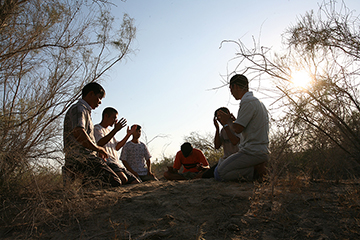
MF: Is there anything else you might want to leave MF readers with?
BT: It has been a privilege to serve our Lord over nearly 50 years of mission ministry. I thought I would live and die in Latin America as a life-long missionary in my beloved Spanish language and continent. I did “die” when God invited me to move to the US. I taught two years at Trinity Evangelical Divinity, TEDS, and then God opened the door to the WEA Mission Commission. Never in my wildest imagination did I conceive that I would have the honor to witness the full globalization of mission, to journey alongside my colleagues in Asia, Africa, Latin America, the Middle East, the Caribbean, the South Pacific, Europe and North America, as the moving Spirit of God led the Church of Christ in mission from everywhere to everywhere. Sure, a gargantuan task awaits us, but my honor has been to witness this remarkable advance of the kingdom of God in Christ.
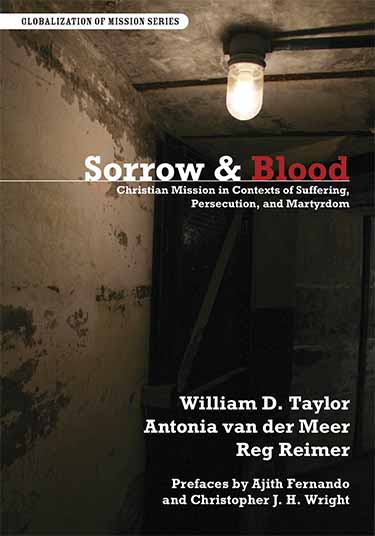 We are convinced that present and future cross-cultural servants will profit deeply from this resource anthology. We are encouraged that the Portuguese version is in final stages of production, the Korean one has started, and that the book is now available in an electronic “Kindle” format. [To order: https://www.missionbooks.org/products/detail/sorrow-blood ]
We are convinced that present and future cross-cultural servants will profit deeply from this resource anthology. We are encouraged that the Portuguese version is in final stages of production, the Korean one has started, and that the book is now available in an electronic “Kindle” format. [To order: https://www.missionbooks.org/products/detail/sorrow-blood ]
A final personal word. In Foxes Book of Martyrs I read of Rowland Taylor. Just three years ago I discovered that he is my direct ancestor; martyrs blood runs through my family. All of a sudden, the topic hit home personally. I am a direct descendent of Rev. Dr. Rowland Taylor, Anglican rector of a country church, born in 1510, died 1555. A graduate of Cambridge University, he had served as chaplain to Thomas Cranmer. He was married to Margaret, William Tyndale’s niece (yes, the Bible translator). Imprisoned several times for his Reformed faith, he was burned at the stake in Hadleigh, Suffolk, England, thanks to Queen Mary, whose hands were stained with so much innocent blood.
“He found the prisons to be quite a fruitful ground for the gospel. Queen Mary put so many believers in Christ in prison that ‘... almost all the prisons in England were become the right Christian Schools and churches, prisons turned into churches and churches into dens of thieves.’” John Foxe writing about Rowland Taylor’s experiences in prison in Suffolk, England”. (Accessed on August 20, 2013).
In other words, I stand in the historical stream of his spiritual legacy, as do my children, and my grandchildren.
Suffering because of Christ is a global growth industry, and will only intensify as we sense the birth pangs of an “ending season” of world history, and as we enter another historical paroxysm against the Christian faith and its devoted followers. May we be found prepared, rooted and faithful. “In this world you will have tribulation. But be of good cheer, for I have overcome the world!”









comments